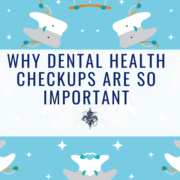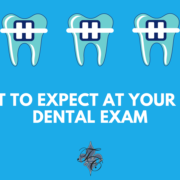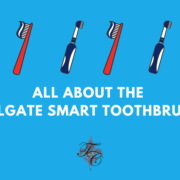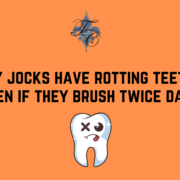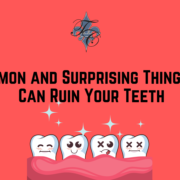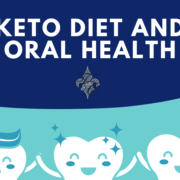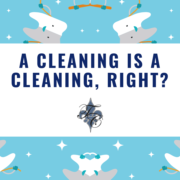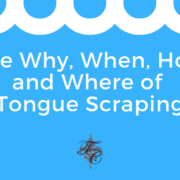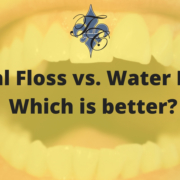All about the Colgate smart toothbrush
/in dental hygiene/by adminYou’ve heard of smart phones, smart TVs, smart watches, the list goes on. But a smart toothbrush? Yes, it’s (almost) here.
Colgate is introducing the Plaqless Pro smart electric toothbrush in 2020. When it’s released, it will be the first toothbrush to detect “biofilm buildup” (or dental plaque) and coach in real time while you brush.
What makes this toothbrush “smart”?
The toothbrush will include the following features:
- Users will be able to see when they need to brush longer in one area of their mouth or, conversely, when all the biofilm buildup has been removed.
- A blue light will tell users when plaque has been found, and then a white light will appear when all is removed and it’s time to move on to other areas of your mouth.
- The Colgate Connect app will connect to the toothbrush through Bluetooth technology, giving users a “precise, personalized brushing experience.”
- Sensors in the toothbrush handle will create a comprehensive map of your mouth.
- Users will be able to turn to the app to see exactly where they brushed their teeth, where they missed a spot, and if an area they just brushed is really clean.
- The app will also provide brushing feedback, coaching, personalized oral health data and tips for good oral health.
“In the dentist’s office, we’re beginning to see a shift toward precision oral care that tailors treatment to each patient’s specific needs,” said Dr. Maria Ryan, Colgate’s Chief Dental Officer. “The Colgate Plaqless Pro smart electric toothbrush is inspired by that shift, and improves brushing efficacy by accounting for an individual’s brushing technique and the biofilm buildup in their mouth. And by immediately alerting the user when an area is clean, Plaqless Pro coaches them to brush better, helping both the patient and the oral care provider to build an even stronger partnership in achieving optimal oral health.”
And while this new toothbrush is sure to bring smiles to a lot of faces, there’s no substitute for your twice-a-year professional cleaning and checkup at your favorite dentist’s office. What are you waiting for? Call Dr. Tim Chauvin’s office today to make an appointment!
Why jocks have rotting teeth — even if they brush twice daily
/in dental hygiene/by adminAthletes are known to take extra special care of their bodies. After all, they need them to excel on the field, right?
Although their oral care routines are seemingly no different (94 percent of athletes surveyed said they brushed twice daily and flossed regularly), a study of a few hundred athletes showed their oral health was below average.
In fact, out of 352 Olympic and professional athletes who compete in sports like cycling, swimming, football and rugby, almost half of them had untreated tooth decay, and most of their gums were inflamed.
But why? Researchers believe sugary sports drinks, energy bars and gels are contributing to the alarming numbers.
It’s common knowledge that sugar leads to tooth decay. How does the sugary soda or sports drink — or the too-often candy bar — lead to poor oral health?
Your mouth is full of bacteria, some of them good, some of them bad.
Some of the bad ones, researchers found, produce acid when they come in contact with sugar. Acid erodes the enamel that coats your teeth. Enamel is what protects your teeth from tooth decay. Without it, your teeth are more susceptible to decay and other problems.
Luckily for humans, the minerals found in your saliva, like calcium and phosphate, work to reverse the process of acid eroding enamel. But those minerals can only do so much when they’re constantly under attack from acids caused by sugar.
Over time, the enamel is destroyed, and that’s where cavities start. Cavities are the holes in your teeth that form as a result of tooth decay. When cavities go untreated, it can cause pain and tooth loss.
Advice for athletes: Look for sports recovery drinks that aren’t loaded with sugar.
And most important: Schedule regular checkups at Dr. Tim Chauvin’s office to keep your oral health in check!
7 Common and Surprising Things That Can Ruin Your Teeth
/in dental hygiene/by adminWe’ve all heard over and over that sugar is bad for your teeth, but there’s a long list of other things that can harm your oral health – and some of them are surprising.
Here are seven other obvious – and not so obvious – things that can ruin your smile:
- Biting things that aren’t food: Do you ever use your teeth to rip open a plastic bag? Or bite your nails? How about chewing on ice? They may seem harmless because your teeth are quite sharp, especially ice because it’s just frozen water, but they’re not. Biting your nails and other nonfood items can cause gingivitis and tooth loss, because the tips of your teeth that you use to bite are the thinnest and weakest part. They’re more susceptible to chipping and breaking.
- Sticky foods and fruit smoothies: Peanut butter, gummy vitamins and marshmallows are tempting for kids and grownups alike, but dentists recommend limiting your intake of sticky foods and even gummy vitamins. Sticky substances stay on your teeth longer, and then they break down and become acids that can erode your enamel. And fruit smoothies? They’re increasing in popularity as a healthy option, but they’re high in sugar – and high in acid. And as we just mentioned, acid erodes your tooth enamel. If you’re not willing to limit your intake of smoothies, sip them through a straw and drink lots of water after to rinse the acid out of your mouth.
- Too much brushing and flossing: Can too much of a good thing be a bad thing? In the case of brushing and flossing, yes. If you’re using a hard-bristled brush and pushing down hard on your teeth, you’re doing it wrong. You could be wearing down your enamel and maybe even causing your gums to recede. Opt for a soft toothbrush next time you’re at the pharmacy, and be careful not to press down too hard on your gums while flossing.
- Grinding your teeth or clenching your jaw: You may not even know you’re doing it, but do you ever wake up with a sore jaw or face? That’s a sign you’re grinding your teeth at night. It could be from stress or from other conditions, but whatever the cause, it’s obviously not good for your teeth. Consult with a dentist if you’re having this problem. They might recommend a mouthguard or something else.
- Drug abuse: You may have heard of “meth mouth,” or the rapid deterioration of teeth for people addicted to crystal meth, but meth isn’t the only drug that can cause problems for your teeth. Cocaine, ecstasy, heroin – and even marijuana – can harm your oral health.
- Alcohol: Just like caffeine, alcohol lessens the amount of saliva that flows in your mouth. Prolonged abuse of alcohol can lead to tooth decay, and even worse, oral cancers.
- Ignoring tooth pain: It may seem like just a little ache, but if you don’t see a dentist soon after, that toothache could turn into something more serious. What starts as a tiny cavity can quickly evolve into infection, which can cause tooth loss or worse.
Don’t let these habits ruin your beautiful smile. Contact Dr. Tim Chauvin’s office today for a checkup.
5 reasons to schedule your dental appointment in time for the new year
/in dental hygiene/by adminDentists and oral care experts across America recommend that you see your dentist for a cleaning and checkup twice a year, so why not start your new year off right with a visit to your favorite dentist’s chair? The time to schedule your new year appointment is NOW!
Here are five reasons why a trip to the dentist early in the year is so important:
- Cleaning off all the plaque build-up from the holidays: Even if you brush twice daily and floss every night, plaque still happens to everyone, especially if you’ve been indulging in sweet treats and other not-so-great for you food items from the holidays. Who wouldn’t want to start off the new year with a set of clean and plaque-free teeth?
- Early detection of gum disease: If you don’t want to stroll into the new year with gingivitis or other gum disease, then schedule your checkup sooner than later. Gum disease can be very harmful to your overall oral health. It can lead to tooth loss and other infections. An early trip to the dentist can prevent the fallout from gum disease.
- Cavity prevention and detection: Do you know how cavities are formed? Cavities are the holes in your teeth that form as a result of tooth decay. When cavities go untreated, it can cause pain and tooth loss. Who wants to start the new year with cavities? No one!
- Bruxism: Have you heard of Bruxism? It might sound scarier than it actually is, but it’s still important to be diagnosed and treated if you have it. Bruxism is grinding, gnashing or clenching your teeth unconsciously, either when you’re sleeping or when you’re awake. If it’s a severe case, it can lead to jaw disorders, headaches, damaged teeth and more.
- Early detection of oral cancer: Oral cancer is found more in people who are older than 45, but it can happen to anyone at any age. Did you know that people with poor oral hygiene — i.e. people who don’t take care of their teeth — are at a higher risk for oral cancer? An early dentist appointment can detect oral cancer – and a trip to the dentist can also educate you on how to properly care for your teeth so you’re not at an increased risk for oral cancer.
If you want to stroll into the new year with a healthy smile, call Dr. Tim Chauvin’s office to schedule your appointment today!
Keto Diet and Oral Health
/in dental hygiene/by adminThe keto diet — an extremely low-carb, high-fat eating plan — has quickly become one of the most popular weight loss fads around. The effect it produces — ketosis — burns fat in your body to produce energy, instead of glucose.
And while many people have found a lot of weight loss success in the keto diet, they’ve also discovered a few unwanted side effects, among them: ketosis breath.
Why does the keto diet cause bad breath?
When your body begins to burn fat instead of glucose, it converts your fat cells into three kinds of ketones, or fat byproducts. One of them — acetone — cannot be used to store energy. When that happens, your body releases the acetone through your urine and your lungs.
The acetone is what gives your breath the “ketosis” smell, kind of a sweet, fruity scent.
Is the keto diet bad for your oral health?
Although ketosis breath is often an unwanted side effect of the keto diet, dentists counter that overall, the keto diet can be better for your oral health. Why?
- When you’re not eating carbs, you’re not eating candy bars, cookies and other processed sugars, the foods dentists say are the worst for your teeth and gums.
- Reducing your sugar intake has long been touted as one way to fight cavities.
- Low-carb diets are also believed to help with inflammation, which contributes to gingivitis.
How to combat ketosis breath
If you don’t like the keto breath, but you like the results you’re seeing with the keto diet, here are a few ways to combat the smell:
- Eat more leafy green vegetables and whole grains, but continue to shy away from refined carbs (think white bread, white potatoes, etc.)
- Drink plenty of extra water.
- Chew sugar-free gum. It helps to stimulate your saliva and makes your breath smell better.
- Keep mouthwash handy.
- Supplement your water or tea with fresh herbs, like clove cinnamon, mint or fennel. All of them are known to be natural breath fresheners.
A cleaning is a cleaning, right?
/in dental hygiene/by adminGoing to the dentist for teeth cleanings and checkups twice a year may not be the most fun thing on your calendar, but failing to do so can result in even more inconvenient — and more painful — trips to the dentist down the road.
The longer you go without regular cleanings, the greater your chances for having to get a deep teeth cleaning. Although many people think “a cleaning is a cleaning,” a deep cleaning is much different than a regular cleaning. Here’s how.
What is a deep cleaning?
Dental professionals often refer to deep cleanings as scaling and root planing. The process involves not only removing plaque and tartar from the surface of your teeth, but also from the “pocket” between your teeth and gums.
How can a hygienist tell if you need a cleaning? He or she will use a probe and measure the area around your teeth. “Pockets” occur when bacteria has built up in between your teeth and gums.
According to the American Academy of Periodontology, a “pocket” occurs when the space between your teeth and gums is five millimeters or more, but ideally those “pockets” won’t be more than three millimeters. These bacteria-filled pockets can lead to gum diseases or other more serious periodontal issues.
If it’s found that you need a deep cleaning, you’ll have to get it done in two separate appointments, and it typically will involve a numbing agent. The deep cleaning will be done with an electric ultrasonic instrument — or a manual scaling tool.
Sometimes, the dentist will have you return for a follow-up appointment after your deep cleaning to make sure those “pockets” are healthier than they were before they were scaled. If the deep clean didn’t eliminate the bacteria, then you might have to see a periodontist
What if I don’t need a deep cleaning?
If your dentist concludes that you don’t need a deep cleaning, then you’ll sit through a regular cleaning, which is less invasive. Here’s what to expect:
- A dental hygienist will use a set of ultrasonic tools to clean your teeth. He or she will work to get rid of plaque and tartar on your teeth and along your gum line.
- The hygienist will also floss in between your teeth. If you feel pain or discomfort at any time during the cleaning, let the hygienist know.
- The hygienist will also polish your teeth and then give your mouth a good rinse.
- After the hygienist is done, you might get X-rays done, depending on the last time your mouth was X-rayed.
Whether you need a regular cleaning or a deep cleaning, it’s something you don’t want to put off until later. Your oral health depends on it!
Contact Dr. Tim Chauvin’s office today to schedule an appointment.
The Why, When, How and Where of Tongue Scraping
/in dental hygiene/by adminDo you ever stop and think about what rests on your tongue? No? Maybe it’s time for you to start.
Tongue scraping has become an increasingly popular addition to oral health regimens across the globe. It’s a quick and easy way to remove particles and bacteria from the surface of your tongue — and help with bad breath. It’s no substitute for twice-a-day brushing and daily flossing, but it’s a good extra step in caring for your mouth.
A dental hygienist said it best to the Cleveland Clinic: “Think about it this way — if your carpet is dirty and you scrub it, the dirt’s going to get embedded down in there,” she explains. “But if you scrape it, it’s going to come right off the surface.”
How does tongue-scraping help your overall oral health?
Over time, dead cells, bacteria and food particles can accumulate on your tongue. All of these things can lead to bad breath.
Using a tongue scraper — a metal or plastic tool that does exactly what it says it does — has several oral health benefits, including:
- Helping your sense of taste: Researchers have said that if you scrape your tongue twice a day, your taste buds could be better equipped to differentiate between spicy, salty, sweet and sour.
- Get rid of that white buildup: Sometimes, excessive buildup on your tongue can cause a white coating to appear. White tongue is caused by an overgrowth and swelling of the fingerlike projections (papillae) on your tongue’s surface. Using a tongue scraper can help to eliminate the buildup – and thus the white coating.
- Eliminate bacteria: The two most common bacteria in your mouth that are widely known for causing bad breath and tooth decay are called Mutans streptococci and Lactobacilli. If you scrape your tongue twice a day, research has shown that these two types of bacteria will be reduced in your mouth. Good news for people who suffer from bad breath!
How to add tongue-scraping to your oral health regimen
If you’re thinking about trying tongue-scraping for the first time, here’s how to do it effectively:
- Brush your teeth for two minutes, then floss and rinse just like you do every day.
- Next, stick out your tongue and lightly run the scraper across the entire surface once or twice. You should start at the back of your tongue and scrape forward.
- This should not be painful, and it should not damage the tongue in any way. If it does, let up on the pressure.
- Rinse the scraper with warm water in between each scraping. Then, when you’re finished scraping, rinse it again — and then rinse your mouth to wash out all the crud you scraped.
- If your tongue is still white after scraping sessions, or if you’re seeing other discoloration (like black or red spots), you should call your dentist.
Do you have other questions about how to properly care for your teeth, gums and tongue? Call Dr. Chauvin’s office today for an appointment!
Dental Floss vs. Water Floss: Which is better?
/in dental hygiene/by adminDo you floss your teeth every day? If you’re not flossing, you should be. Flossing, whether you’re using conventional dental floss or a water irrigator (water floss), is important for removing plaque and debris between teeth and along the gum line.
Flossing properly and daily can reduce your risks for developing dental caries and periodontal (gum) disease. In fact, brushing only cleans about 70% of oral surfaces when performed correctly, so it is important to perform daily Interdental cleaning to safeguard your oral health.
If you’re on the fence about what kind of floss to use, read on for a breakdown on these two Interdental cleaning methods.
Traditional Dental Floss
Flossing with traditional dental floss is effective at removing surface debris from leftover food and daily plaque deposits. Dental floss is thin but strong enough to clean deep between teeth where a toothbrush cannot reach. If you floss correctly, you can control plaque accumulation, disrupt the formation of bacterial colonies at the gum line, and remove food particles lodged in hard-to-reach areas.
Traditional dental floss comes in two varieties: unwaxed and waxed. Many people find that using waxed dental floss is easier and more comfortable.
Water Flossing/Water Irrigators
Water flossing involves using a handheld device that emits pulses of water streams. These streams of water help flush the spaces between teeth and along the gums. Water floss can remove plaque and debris from food but some dentists disagree on whether this form of Interdental cleaning is superior to conventional flossing.
Some people choose to use water irrigators in conjunction with conventional flossing and brushing. Others with braces or prosthetics like bridges may choose to use a water irrigator because it is more convenient. Those with fixed and implant-supported bridges benefit from using water flossers to clean underneath their prosthetics.
Floss Like a Professional
Flossing is important and the techniques with which you floss can make a difference in reducing your risks for common oral diseases. Improper flossing will not remove bacteria and plaque as thoroughly as using proper flossing technique. Moreover, the quality of the tools you use for Interdental cleaning matters. Always look for the American Dental Association’s (ADA) seal of acceptance when purchasing any oral hygiene products.
Dental Floss: Tips and Tricks
Dentists and dental hygienists are experts at making the most of dental floss. Their technique for flossing, even with conventional dental floss, is effective at cleaning hard-to-reach areas in the oral cavity. When you mirror the technique of the pros at home, you take charge of your oral health.
First, begin with about an 18-inch strand of floss. Wrap dental floss around each index finger or middle finger (whichever is more comfortable). Leave a section of one to two inches of floss between your fingers. Your thumbs can come in handy for directing floss between your upper set of teeth. Use a clean one- to two-inch section of floss for each space between teeth. Using clean floss for each section is important because dirty floss can lodge unwanted food and bacteria between teeth.
Be sure to floss gently and slowly. Vigorous and improper flossing could cut into the gums, increasing your risks for gingival irritation and inflammation. With practice, you can floss like a pro and strengthen your oral health in the process.
Water Floss: Tips and Tricks
Many people enjoy using water flossers because it is easier to use. Instead of threading conventional floss between teeth, you will hold a handheld device over each section between teeth and along the gums. This device will send a gentle yet steady stream of water that helps remove food particles and plaque.
Water flossers are very helpful for cleaning behind the archwires and around the brackets of braces, too. Some people find cleaning underneath prosthetics like bridges with water irrigators convenient as well. You can also use your water irrigator to dislodge food from the pits and fissures of teeth. This is a handy method for ensuring that the molars at the back of your mouth are clean.
When buying a water flosser, be sure to consult with our Lafayette, LA dentist for product recommendations. You can also look for the ADA seal of acceptance on water floss packaging to ensure that you’re buying a quality product.
Our general and restorative dentist is happy to make recommendations for oral care products and provide additional tips for effective oral hygiene practices. We serve patients throughout Lafayette, LA. Call our practice to schedule an appointment for a cleaning or checkup.

